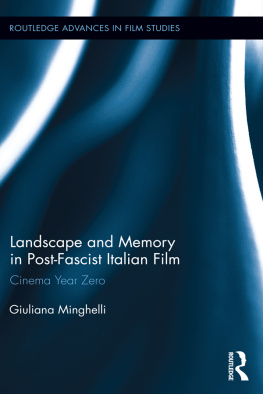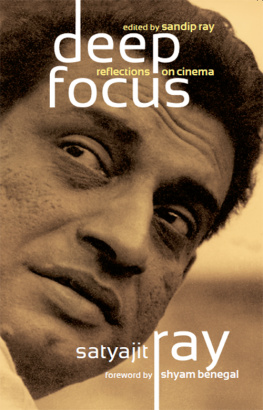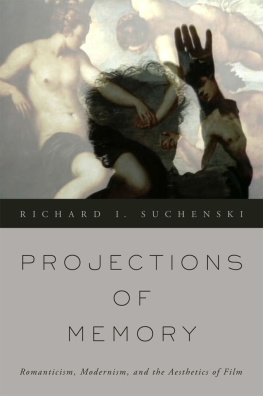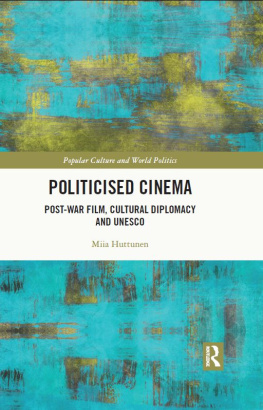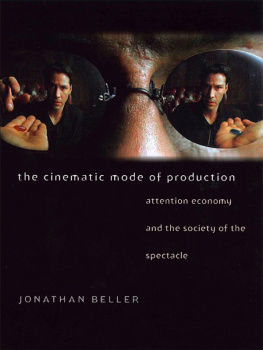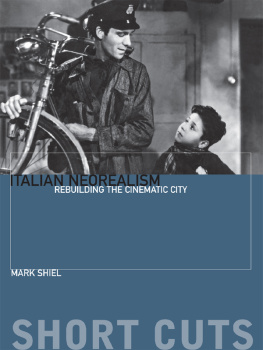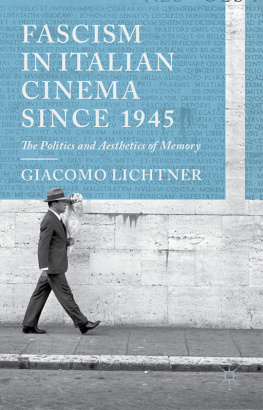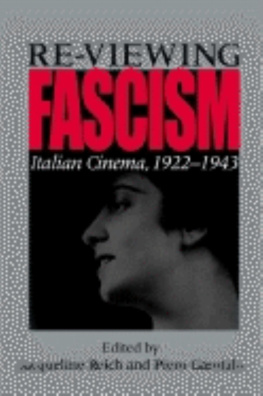Landscape and Memory in Post-Fascist Italian Film
This study argues that neorealisms visual genius is inseparable from its almost invisible relation to the Fascist pasta connection inscribed in cinematic landscapes. While largely a silent narrative, neorealisms complex visual processing of two decades of Fascism remains the greatest cultural production in the service of memorialization and comprehension for a nation that had neither a Nuremberg nor a formal process of reconciliation. Through her readings of canonical neorealist films, Minghelli unearths the memorial strata of the neorealist image and investigates the complex historical charge that invests this cinema. This book is both a formal analysis of the new conception of the cinematic image born from a particular crisis of memory, and a reflection on the relation between cinema, memory, and historical forgetting. Films discussed include Ossessione (1943), Pais (1946), Ladri di biciclette (1948), and Cronaca di un amore (1950).
Giuliana Minghelli is Associate Professor of Romance Languages and Literatures at Harvard University in Cambridge, Massachusetts.
Routledge Advances in Film Studies
Nation and Identity in the New German Cinema
Homeless at Home
Inga Scharf
Lesbianism, Cinema, Space
The Sexual Life of Apartments
Lee Wallace
Post-War Italian Cinema
American Intervention, Vatican Interests
Daniela Treveri Gennari
Latsploitation, Exploitation Cinemas, and Latin America
Edited by Victoria Rutalo and Dolores Tierney
Cinematic Emotion in Horror Films and Thrillers
The Aesthetic Paradox of Pleasurable Fear
Julian Hanich
Cinema, Memory, Modernity
The Representation of Memory from the Art Film to Transnational Cinema
Russell J.A. Kilbourn
Distributing Silent Film Serials
Local Practices, Changing Forms, Cultural Transformation
Rudmer Canjels
The Politics of Loss and Trauma in Contemporary Israeli Cinema
Raz Yosef
Neoliberalism and Global Cinema
Capital, Culture, and Marxist Critique
Edited by Jyotsna Kapur and Keith B. Wagner
Koreas Occupied Cinemas, 18931948
The Untold History of the Film Industry
Brian Yecies with Ae-Gyung Shim
Transnational Asian Identities in Pan-Pacific Cinemas
The Reel Asian Exchange
Edited by Philippa Gates & Lisa Funnell
Narratives of Gendered Dissent in South Asian Cinemas
Alka Kurian
Hollywood Melodrama and the New Deal
Public Daydreams
Anna Siomopoulos
Theorizing Film Acting
Edited by Aaron Taylor
Stardom and the Aesthetics of Neorealism
Ingrid Bergman in Rossellinis Italy
Ora Gelley
Postwar Renoir
Film and the Memory of Violence
Colin Davis
Cinema and Inter-American Relations
Tracking Transnational Affect
Adrin Prez Melgosa
European Civil War Films
Memory, Confl ict, and Nostalgia
Eleftheria Rania Kosmidou
The Aesthetics of Antifascism
Radical Projection
Jennifer Lynde Barker
The Politics of Age and Disability in Contemporary Spanish Film
Plus Ultra Pluralism
Matthew J, Marr
Cinema and Language Loss
Displacement, Visuality and the Filmic Image
Tijana Mamula
Cinema as Weather
Stylistic Screens and Atmospheric Change
Kristi McKim
Landscape and Memory in Post-Fascist Italian Film
Cinema Year Zero
Giuliana Minghelli
First published 2013
by Routledge
711 Third Avenue, New York, NY 10017
Simultaneously published in the UK
by Routledge
2 Park Square, Milton Park, Abingdon, Oxon OX14 4RN
Routledge is an imprint of the Taylor & Francis Group, an informa business
2013 Taylor & Francis
The right of Giuliana Minghelli to be identified as author of this work has been asserted by her in accordance with sections 77 and 78 of the Copyright, Designs and Patents Act 1988.
All rights reserved. No part of this book may be reprinted or reproduced or utilised in any form or by any electronic, mechanical, or other means, now known or hereafter invented, including photocopying and recording, or in any information storage or retrieval system, without permission in writing from the publishers.
Trademark notice: Product or corporate names may be trademarks or registered trademarks, and are used only for identification and explanation without intent to infringe.
Library of Congress Cataloging-in-Publication Data
Minghelli, Giuliana.
Landscape and memory in post-fascist Italian film : cinema year zero / by Giuliana Minghelli.
pages cm. (Routledge advances in film studies ; 23)
Includes bibliographical references and index.
1. Motion picturesItalyHistory20th century. 2. Landscapes in motion pictures. 3. Memory in motion pictures. 4. ItalyIn motion pictures. I. Title.
PN1993.5.I88M55 2013
791.43094509045dc23
2012037408
ISBN: 978-0-415-66108-9 (hbk)
ISBN: 978-0-203-07375-9 (ebk)
Typeset in Sabon
by Apex CoVantage, LLC
Contents
This book grew from diverse soils and was nurtured in different environments. The immediate terrain that supports my thinking and writing has been Harvard University. I am greatly indebted to the students in my film seminars for their shared passion and enthusiasm; I wish I could name them all, because they gave urgency to my research and confirmed the power these films have to make us conceive of and feel the world differently. I would also like to thank colleagues at Harvard and beyond, especially Maria Grazia Lolla, Luca Cottini, and Sarah Hill from the University of New Zealand, whose intellectual collaboration and inspiration in a 20072009 research project on photography and Italian culture enriched the scope of the present volume. I feel a special gratitude to my colleagues in the Romance Languages and Literatures Department for the encouragement they gave meparticularly Virginie Greene, Susan Suleiman, Francesco Erspamer, and Jeffrey Schnappand my readers from the Department of Visual and Environmental Studies, Giuliana Bruno and Tom Conley. In the final stages, as technical matters seemed to get hopelessly complicated, Judson Harward and Nicole Legnani offered their invaluable knowledge and good humor in preparing the books visual apparatus.
My research has greatly benefited from help in my native Italy as well. I am profoundly indebted to Giorgio Boccolari and Arturo Zavattini from the Archivio Zavattini at the Biblioteca Panizzi in Reggio Emilia. I would also like to thank the Cineteca di Bologna and the Cineteca Nazionale in Rome. Among the many intellectual encounters that inspired and sustained my exploration of this contemplative, photographic cinema and its ethical investment, Italian documentarists Angela Ricci Lucchi and Yervant Gianikian left a lasting mark in my heart and mind. Finally, a special thanks to Emidio Isopi for his help in my search for photographic material.
For their insight and generous support as readers, I would like to thank Millicent Marcus, Robert Lumley, Antonio Vitti, and Giuliana Chamedes. From Silvestra Mariniello I discovered new ways of loving cinema; our conversations and shared projects and her unconditional friendship and exacting analysis accompanied this book from inception to realization.

